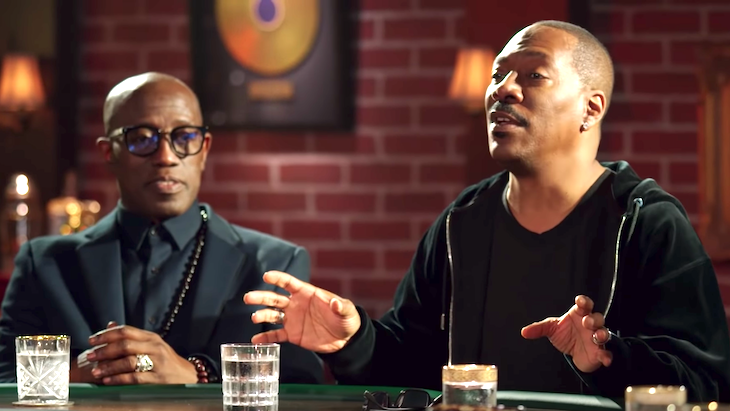
Eddie Murphy Explains Why He Doesn’t Agree With The Term “Blaxploitation Film” (Video)
Eddie Murphy co-produced and stars in Dolemite Is My Name, a new film that looks at the creative pursuits of Rudy Ray Moore. Murphy, who plays Moore and his alter-ego “Dolemite,” began plans to make the movie more than 15 years ago. He recently recalled telling the Arkansas native, who passed away in 2008, of the wish to tell his story to the mainstream. At Jimmy Kimmel Live!, Eddie recalled that Moore dismissed the idea of his story being the subject of a movie. An independent filmmaker, recording artist, and comedian, the senior actor suggested the pair just do some stand-up comedy dates. Although the 1970s Dolemite films never won any significant awards, their impact is compelling: a Black visionary who created his art outside of the Hollywood system, who overlooked him because of his appearance and style.
Netflix, who premiered the Craig Brewer-directed film (which is also in select theaters), produced a round-table with Murphy, Wesley Snipes, Jordan Peele, Mike Epps, Craig Robinson, and other cast members. At the onset of the 23-minute discussion, Murphy rejects a term often used to label films, including Dolemite.
Snoop Details How He Recruited An All-Star Cast Of ’70s Black Actors For “Doggy Dogg World” (Video)
“I don’t know where that term ‘Blaxploitation’ got coined. But I know that period, for us, was like that’s when we were finally getting to see us on the screen. That was a big part of it. The quality of the movies is because the budgets were really low,” Murphy says. “But we were seeing Black stories and Black actors and Black actresses.” Behind him, Wesley Snipes affirms the point.
He continues. “We wasn’t feeling exploited when we were going to see these movies. We wasn’t sitting in the movies going, ‘This is a damn shame how they makin’ us look!’ We was just so happy to be up there. I don’t know who started it, that our culture was being exploited on the screen; we never looked at it like that.” Snipes adds that there was a level of cooperation within the casts of these films that seems lacking in today’s industry.
John Amos Reveals He Was Fired From Good Times For Trying To Make It More Authentic (Video)
Melvin Van Peebles wrote, directed, starred in, and scored 1971’s Sweet Sweetback’s Baadasssss Song. Spike Lee has highlighted the gravity of the work. “Sweet Sweetback’s Baadasssss Song gave us all the answers we needed. This was an example of how to make a film—a real movie, distribute it yourself, and most [importantly], get paid. Without Sweetback who knows if there could have been [later films], She’s Gotta Have It, Hollywood Shuffle, or House Party?” Gordon Parks directed two of the Shaft films, while his son called the shots for Superfly and Three The Hard Way. Academy Award-winning actor Sidney Poitier directed the Richard Wesley script for 1974’s Uptown Saturday Night. Actor Fred Williamson wrote and co-produced 1975’s Boss Ni**er, a Western. That same year, Eric Monte wrote Cooley High, a coming-of-age drama, while Poitier directed Let’s Do It Again. 1975 was also the year of Moore’s first Dolemite film.
Whereas Van Peebles launched with an in-house operation, old-guard Hollywood continued to infiltrate and mimic this art-form. 1973 “James Bond” film Live And Let Die is one such example, adapting a mid-1950s novel to a world that was popular in cinemas at the time.
Jim Kelly Was So Much More Than The World’s First Black Martial Arts Star…
In 1976, New York Times film critic Vincent Camby opined on these films, which he labeled “Black exploitation.” In a column now available online (“Are Black Films Losing Their Blackness?”), Camby wrote, “It may not actually be a trend as yet—it may simply be a superficial impression, based on several weeks of rather ordinary movie‐going—but it does seem as if the bottom has dropped out of the market for black exploitation films. I’m referring to those supercharged, bad‐talking, highly romanticized melodramas about Harlem superstuds, the pimps, the private eyes and the pushers who more or less singlehandedly make whitey’s corrupt world safe for black pimping, black private‐eyeing and black pushing. By next week I may be eating my hat, [but] right now it seems as if more and more films that once would have been categorized as black films are really films for the general market. They are black films that you don’t have to be black to respond to favorably, or to find dreary and pretentious. foolish and inept.”
Many films of this era have dialogue, action sequences, and music emulated over the last 30 years. Quentin Tarantino’s 1997 Foxy Brown homage, Jackie Brown, led to mass recognition and an Oscar nomination for Robert Forster. Meanwhile, Hip-Hop artists from Snoop Dogg to Camp Lo, Pete Rock to Ghostface Killah, have ushered new audience interest to the original films.
Meagan Good Is Reprising Pam Grier’s Role As “Foxy Brown”
As Dolemite Is My Name shows the comedy alongside the real-life pains of progress for Rudy Ray Moore, he puts the term “Blaxploitation” under re-examination.
Later in the round-table, Wesley Snipes (who was passed over for the original Coming To AmericaSnipes has a role in upcoming sequel) discusses his working relationship with Eddie Murphy today. .